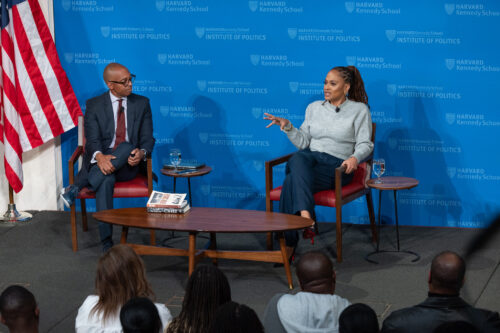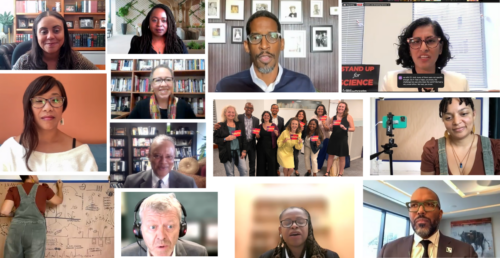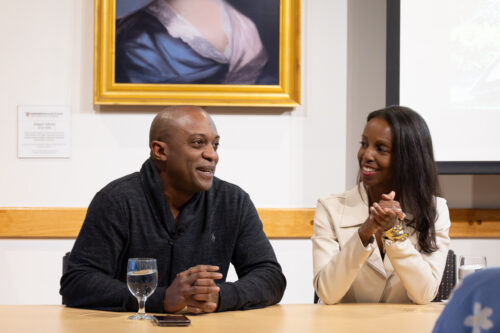
Video
A Conversation with Ava DuVernay: Resistance, Storytelling, and Film
Professor Khalil Gibran Muhammad was joined by Oscar-nominated filmmaker and screenwriter Ava DuVernay in JFK Jr. Forum
Feature
During the fifth-annual convening of the Truth and Transformation Conference hosted by the Institutional Antiracism and Accountability Project (IARA), experts discussed challenges as well as best practices for holding organizations accountable for antiracist change.
“I love that the name of the conference is Truth and Transformation. And I would say that you cannot have transformation without looking very straight in the face of the truth of what has happened,” said Christine Cordero, co-director of the Asian Pacific Environmental Network (APEN), during the lunch keynote address of IARA’s Truth and Transformation Conference earlier this fall.
For its annual conference this fall, IARA brought together experts from multiple disciplines for four cross-sector panel discussions on organizational accountability. Throughout the two-day convening, experts explored real-world strategies for implementing organizational accountability to affect antiracist change as well as sharing their insights into what works, what doesn’t, and their hopes for the future.
The following excerpts, edited for clarity and length, are taken from the remarks of the speakers:
Dr. Beverly Tatum, president emerita of Spelman College, explained that by learning how to talk, and grapple with race at an early age, students were much better equipped to engage and confront the topic as they grew older.
“Most of the students in my class were white, and they’d grown up in silence about the topic of race and racism, and yet it impacts everyone’s life. And the more that they learned, the more they felt that that silence had been a disservice to them.”
“The kids who grew up in race-conscious families were much more self-confident in their sense of identity. They encountered racism but [they] didn’t name it and they were not defeated by it.”
Panelists explained how race and environmental issues were firmly intertwined and will become even more so as communities adapt to climate change in the coming years.
“Climate change will be the magnifying glass that will make worse the current inequities,” noted Christine Cordero, co-director of the Asian Pacific Environmental Network (APEN). “If we keep thinking about climate, economy, and housing as separate things, we’re missing the picture of what could be possible, because this is a systemic issue that needs systemic change.”
“To understand what accountability means in the environmental sector, we have to recognize there’s a growing body of research that shows that pollution is not distributed equally,” shared Chitra Kumar, managing director of the Climate and Energy Program, Union of Concerned Scientists.
Speakers draw on their experiences as professionals to highlight the drawbacks they’ve encountered throughout the process of establishing true organizational accountability.
“Institutional accountability is not going to happen naturally. By their very definition, industries and corporations are meant to make money, so if we want to hold them accountable, it requires so many extra levers,” explained Christine Cordero.
“To me, numbers and data are not enough to actually motivate people and create sustainable change over time,” said Dr. Aletha Maybank, senior vice president within the American Medical Association.
“There’s the consistent theme of racists, abusers…those in power…who like to dangle a little something and hope that you settle for it. It reminds me of the phrase ‘better than nothing’. And that’s problematic,” noted Akil Bello, senior director of Advocacy and Advancement at Fairtest.
“There needs to be a reconciliation beyond the courts, beyond this kind of ‘waging law fair,’ as many had put it, to more education and reconciliation which begins with acknowledgment,” said Raymond Frogner, head of archives at the National Centre for Truth and Reconciliation.
Experts also discuss what it looks like to put into practice policies and regulations that foster a culture of greater accountability and transparency.
“Building racial equity into the mission, vision, and values; incorporating it into the budget and to the strategic plan; having mechanisms to hold leadership accountable for results…those are all things that organizations can do to hold themselves accountable to certain standards,” explained Hannibal B. Johnson, author, attorney, and consultant specializing in DEI.
“I don’t think you can have accountability without supporting and building a [workplace] culture that allows for greater transparency, and greater psychological safety in order to have the kind of real truth-telling that accountability requires,” said Dr. Aletha Maybank.
“It’s not just pointing the fingers and telling someone else ‘go do it right.’ It’s you doing it right and taking that personal accountability. That is what has the ripple effects in the corporate space,” shared Dawn James, managing director leading ESG Strategy, Sustainability & Digital Transformation at Deloitte.
“One of the things that I do like about working with corporations is that they are far more agile than these large government bureaucracies. When a corporation says we’re going to do this thing, people tend to fall in line and things tend to happen quickly,” said Lea Nicholas-MacKenzie, co-founder of JWR Business Group and founder of LNM Indigenous Consulting.
“The work [to achieve organizational accountability] should get harder. If the work itself becomes the reward, there’s no stopping it — that’s the kind of imagination we need to change the world,” said Lorenzo Herrera y Lozano, writer, organizational strategist, and co-director of Justice Funders.
To watch the full remarks from the panelists and keynote speakers, check out the recordings of the discussions on our YouTube channel:
Video
Professor Khalil Gibran Muhammad was joined by Oscar-nominated filmmaker and screenwriter Ava DuVernay in JFK Jr. Forum
Video
Artist Hank Willis Thomas spoke with Harvard professor Sarah Elizabeth Lewis about how love guides his artwork at a Harvard Kennedy School Institute of Politics forum.
Feature
This reading list from the Institutional Antiracism and Accountability Project explores the intersection of sports and racial justice, in the lead-up to their panel on March 19.
Video
Professor Khalil Gibran Muhammad was joined by Oscar-nominated filmmaker and screenwriter Ava DuVernay in JFK Jr. Forum
Video
Artist Hank Willis Thomas spoke with Harvard professor Sarah Elizabeth Lewis about how love guides his artwork at a Harvard Kennedy School Institute of Politics forum.
Feature
This reading list from the Institutional Antiracism and Accountability Project explores the intersection of sports and racial justice, in the lead-up to their panel on March 19.


